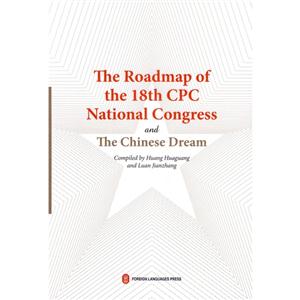-
>
中共中央在西柏坡
-
>
中国历代政治得失
-
>
中国共产党的一百年
-
>
在庆祝中国共产主义青年团成立100周年大会上的讲话
-
>
中国的民主
-
>
中华人民共和国六十年实录(套装共10册)
-
>
新书)社会主义发展简史(大字本)
中共十八大:中国梦与世界:CPC national congress and tie Chinese dream 版权信息
- ISBN:9787119086477
- 条形码:9787119086477 ; 978-7-119-08647-7
- 装帧:一般胶版纸
- 册数:暂无
- 重量:暂无
- 所属分类:>>
中共十八大:中国梦与世界:CPC national congress and tie Chinese dream 本书特色
中共十八大是中国进入全面建成小康社会决定性阶段召开的一次十分重要的大会,国际社会高度关注,普遍希望了解十八大的相关情况,了解十八大后中国、中国共产党以及中国与世界关系的发展走向。为了让国际社会更好地理解中共十八大精神、更好地了解中国共产党和中国的初衷和愿望,针对国际社会的关切,中联部研究室以十八大报告为基础,根据中央党校、中央文献研究室、中央党史研究室及中央编译局、中国外文局等部门提供的相关材料,黄华光、栾建章编写了这本《中共十八大(中国梦与世界)(英文版)》。本书分为三个部分共十二章,分别论述了“十八大之后的中国共产党向何处去?”,“十八大之后的中国向何处去?”以及“十八大之后的中国与世界关系向何处去?”这三个当下*关键、*重要,也*受国际社会关注的问题。
中共十八大:中国梦与世界:CPC national congress and tie Chinese dream 内容简介
中共十八大是中国进入全面建成小康社会决定性阶段召开的一次十分重要的大会,国际社会高度关注,普遍希望了解十八大的相关情况,了解十八大后中国、中国共产党以及中国与世界关系的发展走向。为了让国际社会更好地理解中共十八大精神、更好地了解中国共产党和中国的初衷和愿望,针对国际社会的关切,中联部研究室以十八大报告为基础,根据中央党校、中央文献研究室、中央党史研究室及中央编译局、中国外文局等部门提供的相关材料,黄华光、栾建章编写了这本《中共十八大(中国梦与世界)(英文版)》。本书分为三个部分共十二章,分别论述了“十八大之后的中国共产党向何处去?”,“十八大之后的中国向何处去?”以及“十八大之后的中国与世界关系向何处去?”这三个当下*关键、*重要,也*受国际社会关注的问题。
中共十八大:中国梦与世界:CPC national congress and tie Chinese dream 目录
part one
where will the cpc go following its 18th cpc
national congress?
chapter 1 does the cpc still believe in communism?
why does the cpc hold high the banner
of socialism with chinese characteristics?
is socialism with chinese characteristics
still true socialism?
what is the difference between socialism
with chinese characteristics and
democratic socialism?
why are the guiding thoughts
of the cpc constantly adjusted?
chapter 2 who will accomplish the mission of the cpc?
how does the cpc admit new party members?
how does the cpc select and appoint cadres?
how are the top cpc leaders elected?
what is the policy of personnel management
that the cpc pursues?
chapter 3 what if dissenting voices arise inside the cpc?
what is the organizational principle
of the cpc?
how does the cpc develop intra-party
democracy?
why does the cpc constantly strengthen
its discipline?
how does the cpc exercise its leadership?
chapter 4 where does the cpc's advanced nature
come from?
once advanced, always advanced?
what factors does the cpc depend
on to maintain its advanced nature?
can the cpc check corruption?
part two
where will china go after the 18th cpc
national congress?
chapter 5 will chinas economy continue to grow?
why can chinas economy maintain
rapid long-term growth?
does chinas economy still have potential
to grow?
how will china update its economy?
chapter 6 where will china go in reforming
its political structure?
what is "chinese-style democracy"?
why does china not adopt the multi-
party system?
why does china not apply the separation
of powers?
is law-based governance compatible with
the party's leadership?
is elective democracy the only legitimate form?
how do the chinese people participate in
and deliberate on state affairs?
chapter 7 how should its people build china into
a cultural power?
what kind of a cultural power does china
want to become?
will an emphasis on core values affect
cultural diversity?
can cultural freedom and cultural
responsibility be unified?
will china engage in "exporting its culture"?
chapter 8 can china really build a harmonious society?
what kind of changes have occurred
in chinese society?
what is the cpc's philosophy for social
construction?
how does the communist party of china
resolve the issue of employment?
what kind of social insurance system
is china to build?
will china really take action to change
the current structure of interests?
chapter 9 how can we make china beautiful?
focusing on ecological progress:
no alternative or strategic choice?
building a beautiful china: lip service,
or a real commitment?
fighting climate change: good faith or fake?
part three
how should chinas relationship with the rest
of the world progress after the 18th cpc
national congress?
chapter 10 how should china advance on its road
of peaceful development?
will china genuinely take the road of
peaceful development?
will china continue its commitment to
a non-aggressive national defense policy?
does chinas peaceful development have
a "bottom line principle"?
chapter 11 can china really achieve win-win results
with other countries?
has china slowed down the pace of opening
up to the outside world?
what is chinas view of trade liberalization?
what would happen in the case of trade
friction with other countries?
why does china attach no conditions to
its foreign aid?
is china engaging in neo-colonialism
in africa?
chapter 12 what role will china play as a new power?
will china adjust its policies of
"non-interference" and "non-alignment"?
will all-out confrontation occur between
china and the usa?
does china intend to "keep friendly
relations with distant states and attack
its neighbors"?
will china continue to speak for developing
countries?
what kind of international order does
china advocate?
afterword
- >
有舍有得是人生
有舍有得是人生
¥17.1¥45.0 - >
经典常谈
经典常谈
¥12.7¥39.8 - >
伊索寓言-世界文学名著典藏-全译本
伊索寓言-世界文学名著典藏-全译本
¥9.3¥19.0 - >
随园食单
随园食单
¥15.4¥48.0 - >
人文阅读与收藏·良友文学丛书:一天的工作
人文阅读与收藏·良友文学丛书:一天的工作
¥14.7¥45.8 - >
名家带你读鲁迅:朝花夕拾
名家带你读鲁迅:朝花夕拾
¥10.5¥21.0 - >
史学评论
史学评论
¥23.5¥42.0 - >
苦雨斋序跋文-周作人自编集
苦雨斋序跋文-周作人自编集
¥6.9¥16.0
-
国际友人在延安
¥17¥50 -
共产党宣言
¥11.5¥19.8 -
中共重大历史事件亲历记-(全2册)
¥34¥97 -
中国共产党的九十年-(全三册)
¥39¥150 -
评圣皮埃尔神甫的两部政治著作
¥10.2¥19





















